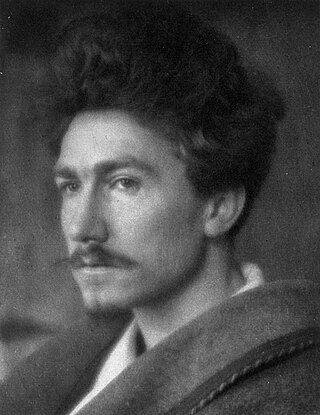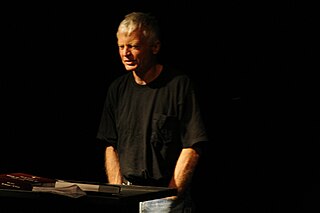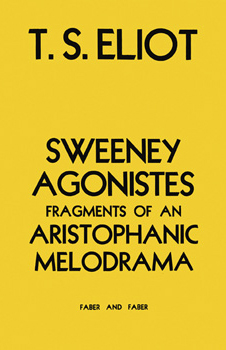
Ezra Weston Loomis Pound was an expatriate American poet and critic, a major figure in the early modernist poetry movement, and a collaborator in Fascist Italy and the Salò Republic during World War II. His works include Ripostes (1912), Hugh Selwyn Mauberley (1920), and his 800-page epic poem, The Cantos.

Imagism was a movement in early-20th-century poetry that favored precision of imagery and clear, sharp language. It is considered to be the first organized modernist literary movement in the English language. Imagism has been termed "a succession of creative moments" rather than a continuous or sustained period of development. The French academic René Taupin remarked that "it is more accurate to consider Imagism not as a doctrine, nor even as a poetic school, but as the association of a few poets who were for a certain time in agreement on a small number of important principles".

Hilda Doolittle was an American modernist poet, novelist, and memoirist who wrote under the name H.D. throughout her life. Her career began in 1911 after she moved to London and co-founded the avant-garde Imagist group of poets with American expatriate poet and critic Ezra Pound. During this early period, her minimalist free verse poems depicting Classical motifs drew international attention. Eventually distancing herself from the Imagist movement, she experimented with a wider variety of forms, including fiction, memoir, and verse drama. Reflecting the trauma she experienced in London during the Blitz, H.D.'s poetic style from World War II until her death pivoted towards complex long poems on esoteric and pacifist themes.
An anacoluthon is an unexpected discontinuity in the expression of ideas within a sentence, leading to a form of words in which there is logical incoherence of thought. Anacolutha are often sentences interrupted midway, where there is a change in the syntactical structure of the sentence and of intended meaning following the interruption.

Louis Zukofsky was an American poet. He was the primary instigator and theorist of the so-called "Objectivist" poets, a short lived collective of poets who after several decades of obscurity would reemerge around 1960 and become a significant influence on subsequent generations of poets in America and abroad.
The Objectivist poets were a loose-knit group of second-generation Modernists who emerged in the 1930s. They were mainly American and were influenced by, among others, Ezra Pound and William Carlos Williams. The basic tenets of objectivist poetics as defined by Louis Zukofsky were to treat the poem as an object, and to emphasize sincerity, intelligence, and the poet's ability to look clearly at the world. While the name of the group is similar to Ayn Rand's school of philosophy, the two movements are not affiliated.

George Oppen was an American poet, best known as one of the members of the Objectivist group of poets. He abandoned poetry in the 1930s for political activism and moved to Mexico in 1950 to avoid the attentions of the House Un-American Activities Committee. He returned to poetry—and to the United States—in 1958, and received the Pulitzer Prize for Poetry in 1969.
The Language poets are an avant-garde group or tendency in United States poetry that emerged in the late 1960s and early 1970s. The poets included: Bernadette Mayer, Leslie Scalapino, Stephen Rodefer, Bruce Andrews, Charles Bernstein, Ron Silliman, Barrett Watten, Lyn Hejinian, Tom Mandel, Bob Perelman, Rae Armantrout, Alan Davies, Carla Harryman, Clark Coolidge, Hannah Weiner, Susan Howe, James Sherry, and Tina Darragh.

Barbara Guest, néeBarbara Ann Pinson, was an American poet and prose stylist. Guest first gained recognition as a member of the first generation New York School of poetry. Guest wrote more than 15 books of poetry spanning sixty years of writing. In 1999, she was awarded the Frost Medal for Lifetime Achievement by the Poetry Society of America.

Conjunctions is a biannual American literary journal founded in 1981 by Bradford Morrow, who continues to edit the journal. In 1991, Bard College became the journal's publisher. Morrow received the PEN/Nora Magid Award for Magazine Editing in 2007. Conjunctions has been the recipient of numerous awards and honors, including the Whiting Foundation Prize for Literary Magazines, and work from its pages is frequently honored with prizes such as the Pushcart Prize, the O. Henry Award, and the PEN/Robert J. Dau Short Story Prize for Emerging Writers.
Mary Oppen, was an American activist, artist, photographer, poet and writer. She published an autobiography, Meaning a Life (1978), and a book of verse, Poems and Transpositions (1980).

Robert Grenier is a contemporary American poet associated with the Language School. He was founding co-editor of the influential magazine This (1971–1974). This was a watershed moment in the history of recent American poetry, providing one of the first gatherings in print of various writers, artists, and poets now identified as the Language poets.
The National Poetry Foundation (NPF) is a book publisher founded in 1971 by Carroll F. Terrell who built its reputation with Burton Hatlen at the University of Maine in Orono. Today it publishes poetry by individual authors as well as both journals and scholarship devoted to Ezra Pound and poets in the Imagist and "Objectivist" traditions. It has also positioned itself as a center and host for international conferences on modern poetry.
John Taggart is an American poet and critic.
Michael Heller, is an American poet, essayist and critic. Among his many books are Exigent Futures, In The Builded Place, Wordflow and Living Root: A Memoir. He wrote the libretto for the opera, Benjamin, based on the life of Walter Benjamin. He is recipient of awards including the NEH Poet/Scholar grant, New York Foundation for the Arts Fellowship (NYFA), National Endowment for the Humanities award, and The Fund for Poetry.

Stephen Ratcliffe is a contemporary U.S. poet and critic who has published a number of books of poetry and three books of criticism. He lives in Bolinas, CA and is the publisher of Avenue B Press. He was the director of the Creative Writing program at Mills College in Oakland, CA where he has been an instructor for more than 25 years, and continues to teach Creative Writing (poetry) and Literature courses there.
Nationality words link to articles with information on the nation's poetry or literature.

Sweeney Agonistes by T. S. Eliot was his first attempt at writing a verse drama although he was unable to complete the piece. In 1926 and 1927 he separately published two scenes from this attempt and then collected them in 1932 in a small book under the title Sweeney Agonistes: Fragments of an Aristophanic Melodrama. The scenes are frequently performed together as a one-act play. Sweeney Agonistes is currently available in print in Eliot's Collected Poems: 1909–1962 listed under his "Unfinished Poems" with the "Fragments of an Aristophanic Melodrama" part of the play's original title removed. The scenes are separately titled "Fragment of a Prologue" and "Fragment of an Agon".
Pattie McCarthy is an American poet and educator.
S.R. Lavin is a poet who was born in Springfield, Massachusetts on April 2, 1945. Lavin's work has been published in the U.S., England, Poland, China, The Netherlands, Japan and Israel.









